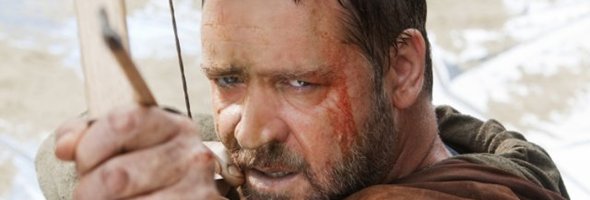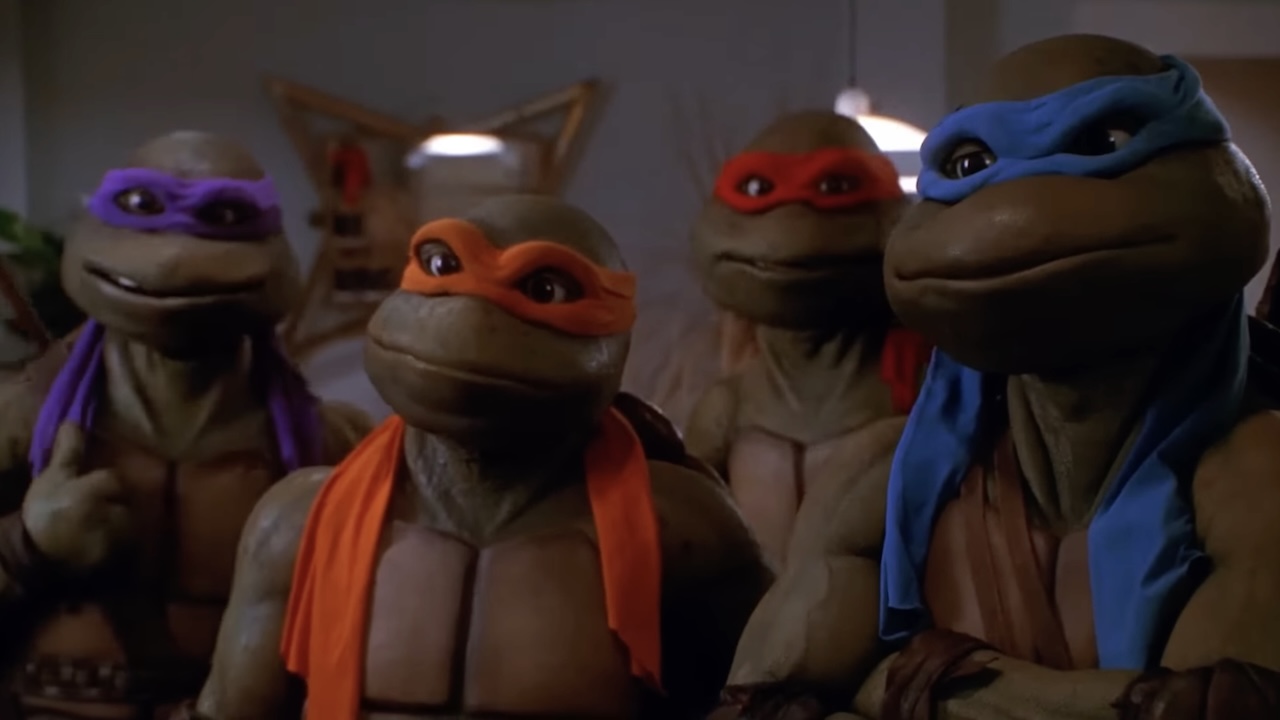About halfway through the Ridley Scott/Russell Crowe Robin Hood, I began pondering the real question raised by this retelling of the Sherwood Forest legend. Is this going to surpass Kevin Costner’s Robin Hood: Prince of Thieves as the worst Robin Hood movie of all time? Going really real in a movie is all well and good, and that’s clearly what Ridley Scott had in mind for his Robin Hood. It’s what (might have) REALLY happened. Not the legend, but the really realistic telling of how some real guy named Robin or Robert or Roberto eventually became the rob-from-the-rich-and-give-to-the-poor folk hero. Unfortunately, when you call a movie Robin Hood, you sorta promise that there will be some fun, and that’s where this movie fails. I mean, telling the real story only gets you so far. If Robin was a clerk, and we showed him entering items on a balance sheet, it might be true, but it’s pretty damn boring. Scott also sets the whole thing up as a “prequel” to the Robin Hood legend and thus gives you a standard old-timey battle movie that bears more than a passing resemblance not to his other Russell Crowe collaboration, Gladiator, but to Mel Gibson’s Braveheart.
It’s an hour into the movie before Robin Longstride (Crowe) even rides into Nottingham for the first time in his life. Longstride (why is it never Bigpackage or Badodor?) serves as an archer in the crusading army of Richard the Lionheart (Danny Houston). The army, which also includes famous Merry Men Will Scarlet (Scott Grimes), Little John (Kevin Durand), and Allan A’Dayle (Alan Doyle), is trying to get Richard back to England after a 10-year absence. After the king is killed, Robin makes a deal with a dying knight, Robert Loxley (Douglas Hodge), to return his sword to his ancient, blind father, Sir Walter Loxley (Max von Sydow). Robin agrees and makes his way to Nottingham, where Walter asks him to pretend to be the dead Robert for the sake of passing his lands onto his daughter-in-law, Marion (Cate Blanchett.)
Meanwhile, back in the palace, Richard has been replaced as king by his brother, John (Oscar Isaac), who is emotional, powerful, and sort of incompetent. His chief advisor, Godfrey (the go-to bad guy, Mark Strong), is giving him bad advice, and the throne’s longtime advisor, William Marshal (William Hurt), is thrown out on his ass. Of course, John starts taxing the peasants, but Godfrey wants to use the trouble stirred up by the taxing to help the French -- led by a man who looks like the second guitar player on a Led Zeppelin tour -- take over.
I know what you're thinking: what does this have to do with robbing from the rich and giving to the poor in Sherwood Forest? Nothing. Robin only goes into the forest once during the movie and encounters the local urchins who have set up camp there. He tells them he can teach them things, and you realize in the sequel (if there is one, with a 50-year-old Crowe playing Robin) they will be part of his Merry Band. So there aren’t many of the cool ambushes you think about with a Robin Hood kinda movie. In fact, there are only two with the four main Merry Men (Robin, Will, John, Alan), and in one, they don’t even shoot any arrows.
There are battle scenes, because the movie is about big battles either between King John’s men and some Northern Barons, or English forces against the French. Robin ends up being a leader of the English forces through some fancy talk that has you wondering when he’s going to say, “They may take our lives, but they can’t take our FREEEEEEEDOM.” The final battle looks like a typical post-LOTR melee and even throws in Marion and some of the Sherwood Forest kids in a “Eowyn and Merry” echo.
The battles are fine and the performances are fine, but as a whole, the movie lacks a fun element. Robin rarely has a light and easy attitude, and when Crowe does switch to that for a few seconds, it’s almost jarring. This feels like a movie made to set up other movies, but why? If you want to give him an origin story, then why not do that for an hour and then make him Robin Freakin’ Hood for the rest of the movie? This is not a Robin Hood movie; it’s a movie about political intrigue, ancient battles, and the almost-not-there wooing of Robert and Marion.
In the end, this movie has enough going for it not to be as bad as Prince of Thieves, but it’s basically a disappointment. Scott has made a visually nice movie with a professional look and decent performances, but he hasn’t instilled any thrills, fun, or even interest in the main characters. If the next movie does get made, it better start incorporating those elements, or this series will need a reboot in about four years. The Blu-ray of Robin Hood highlights the best things about the movie -- such as they are -- the nice visuals. The picture is perfect, and as the swords and arrows do their damage, you can see every frame, even in the nighttime or castle scenes. You also get a plethora of choices for watching the film. The 141-minute theatrical version is available along with a 165-minute director’s cut. A DVD and electronic copy are also included, in case you want to take Russell Crowe to the beach or something.
Your Daily Blend of Entertainment News
Neither Russell Crowe or Ridley Scott provide a commentary track for the movie, but they both take part in something called “Director’s Notebook,” which is feature that can be used with either the theatrical version or the extended cut. It occurs about every 10 to 15 minutes and lasts four or five minutes without stopping the movie. Instead, the screen breaks into three boxes: one showing the movie, one primarily showing photos from the set or Ridley Scott’s storyboards, and one showing either an interview with Scott, Crowe, or some other crew member or some behind-the-scenes footage. They typically relate to the scene being shown and function as sort of an intermittent commentary. Still, an actual, full-blown commentary would have been better.
This quasi-commentary is supported by an hour-long making-of called “Rise and Rise Again: Making of Ridley Scott’s Robin Hood." It can be watched in three separate sections (pre-production, filming, and post-production) or as one longer feature. It’s pretty extensive, and people seem to talk more about the way films get made, or at least how this one did, rather than the usual “happy talk” comments about how everyone is great. Probably the most interesting extra on the disc.
There is also a lengthy “Art of Nottingham” feature that covers concept art, storyboards and pre-viz, costumes, and other items. Rather than making you click through picture after picture, you can watch it as a slide show set to music, which is more enjoyable way to do it. If you’re really artsy and want to see an individual picture, you can click through pic by pic or turn the music off. There are also introductions to each section by the relevant crew member. I’m not really into this stuff, but if you are, it’s certainly done about as well as can be.
If you’ve watched the extended version of the movie with its 15 extra minutes of stuff that’s not that interesting and you still want more, more, more of Scott’s vision, then you can fire up the “Deleted Scenes.” The scenes are not repeats of the stuff added to the extended cut, so they are things that even an overlong movie did not wish to bore you even more with. They are introduced by editor Pietro Scalia, and he does commentary on the scenes themselves, explaining why they were cut out. He’s interesting, and I can’t blame him for anything, but I wished he would have said, “Look, this movie was already 141 minutes, if we put more in, you would literally die of boredom.”
That’s pretty much it except for some of the film’s trailers. It’s a nice package, but the movie sinks it. Not a terrible film, but not interesting, and frankly if I had never seen it, I wouldn’t feel like I missed much.

